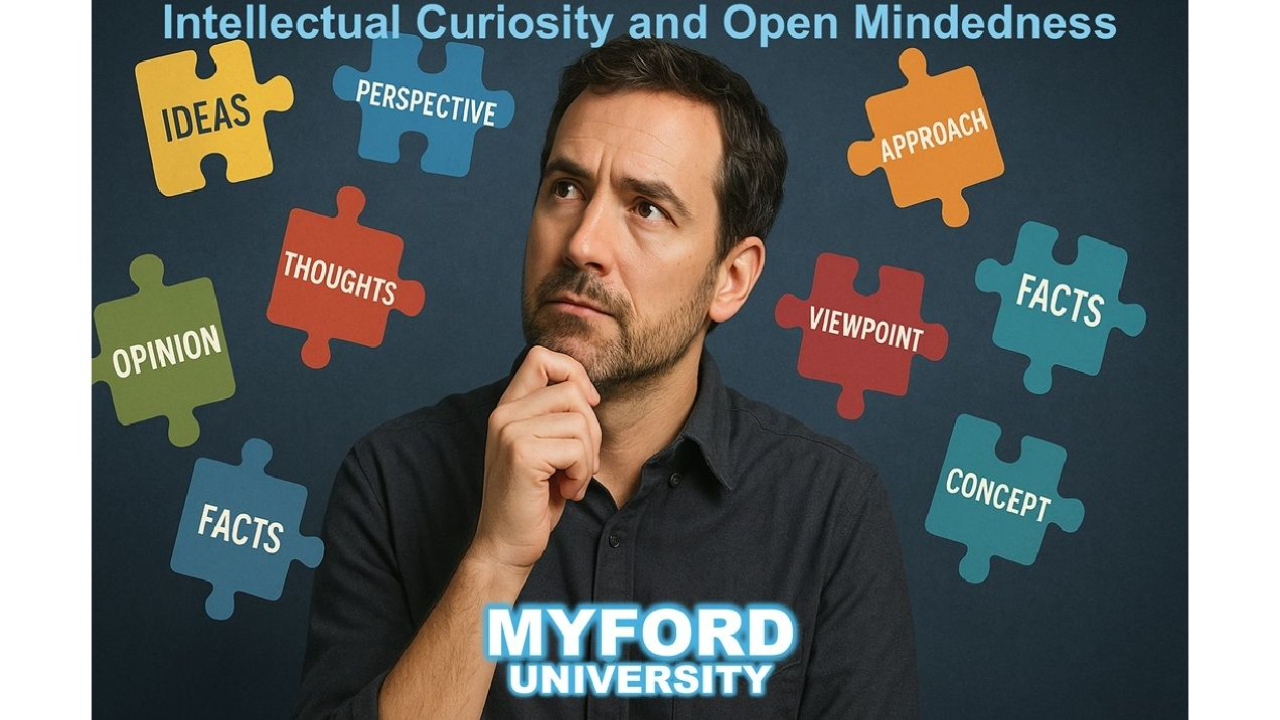The Importance of Intellectual Curiosity and an Open Mind
Jul 08, 2025
At Myford University, we emphasize practical knowledge, lifelong learning, and doing things differently when tradition no longer serves you. The world we live in is increasingly divided along political, social, and cultural lines, intellectual curiosity and an open mind are more vital than ever. These two qualities are not simply nice-to-haves—they are the foundation of real learning, meaningful self-development, and long-term adaptability.
We live in an era of algorithms, echo chambers, and tribal loyalty. Too many people listen only to those who already agree with them. But growth happens at the edges—where tension lives, where disagreement sharpens ideas, and where cognitive dissonance forces reevaluation. Personally, I make it a point to regularly consume content—books, podcasts, articles, videos—from people I deeply disagree with. And not just a little. In some cases, we see the world in completely opposite ways. Yet, this habit has been one of the most useful tools in my intellectual toolkit.
What Is Intellectual Curiosity and an Open Mind?
Intellectual curiosity is the deep desire to learn and understand more about the world, especially things outside of your current knowledge, beliefs, or experiences. It’s about asking questions that don’t have immediate answers. It’s about challenging assumptions—even your own. It’s about wanting to get better, smarter, clearer—not to win arguments, but to deepen understanding.
An open mind, meanwhile, is the willingness to entertain ideas, beliefs, and perspectives that differ from your own without immediately rejecting or dismissing them. It means suspending judgment long enough to evaluate a new perspective on its merits. It doesn’t mean accepting every idea as valid or equally true—but it does mean considering the idea before ruling it out.
Together, these two habits—curiosity and open-mindedness—form the foundation of real learning. They are the mental equivalent of having your ears open and your guard down, which is where most breakthroughs occur.
Why Is It Important?
Because we live in a fast-changing world. The problems we face—personally, professionally, and globally—are not simple. They can’t be solved with soundbites or slogans. They require thinking, testing, discussing, and revising. If you’re not willing to think outside your usual frame of reference, you’re operating with one hand tied behind your back.
Curiosity keeps your mind sharp. An open mind keeps your options wide. Both help you:
- Make better decisions
- Solve tougher problems
- Innovate new solutions
- Build stronger relationships
- Lead more effectively
They also keep you humble. When you realize how much you don’t know, you’re far more likely to keep learning. That’s where wisdom starts.
And here’s the kicker: In the age of AI, automation, and algorithmic decision-making, one of the few things that will remain distinctly human—and highly valuable—is your ability to think creatively, critically, and flexibly. That requires curiosity. That requires an open mind.
Who Can Use It?
Everyone. And I mean everyone.
- Students who want to learn faster and think deeper
- Professionals who want to stay ahead in their careers
- Entrepreneurs who want to see opportunities others miss
- Leaders who want to guide diverse teams
- Parents who want to model lifelong learning for their kids
- Citizens who want to participate meaningfully in a democracy
There is no role in society that doesn’t benefit from these qualities. Whether you’re working in construction or corporate strategy, whether you’re creating content or writing code—your ability to think expansively and explore ideas without fear is what separates the good from the great.
When and Where Should You Use It?
Short answer: all the time, everywhere.
More specifically:
- When consuming media — read across the political spectrum, not just what aligns with your current views
- When solving a problem — ask “What am I missing?” or “What would someone who disagrees with me say?”
- When making decisions — consider unintended consequences, opposing data, and long-term effects
- When in conflict — listen fully before responding, and try to understand their real concerns
- When mentoring or teaching — encourage questions, even hard ones
- When reflecting — ask yourself, “Have my views changed? Should they?”
Whenever you feel certain, proud, angry, or defensive—that’s the best moment to test your openness. That’s where growth lives.
How Do You Practice It?
Here’s how to actively build these habits:
- Ask Better Questions
- Replace “What do I already know?” with “What else might be true?”
- Ask “Why do I believe this?” regularly
- Seek out sources that challenge your thinking
- Explore Opposing Viewpoints
- Read books and blogs from people you disagree with
- Watch debates, not just monologues
- Engage in conversations with those who see things differently
- Practice Non-Reactive Listening
- Let others finish their thoughts
- Don’t plan your rebuttal mid-sentence
- Listen to understand, not just to reply
- Journal and Reflect
- Write down insights from different thinkers
- Track how your ideas evolve
- Be honest about what’s changed and why
- Update Beliefs When Evidence Changes
- Be willing to say, “I was wrong”
- Celebrate new understanding
- Don’t let pride keep you stuck in old thinking
- Build a Curious Network
- Surround yourself with people who challenge your assumptions
- Create a “curiosity circle” of diverse thinkers
- Attend events or communities that broaden your mental map
Five Powerful Reasons to Engage With Opposing Viewpoints
- Pure Intellectual Curiosity (and Sometimes Amusement)
Humans are naturally curious. From toddlerhood, we ask “Why?” until the world beats it out of us. Reclaiming that curiosity fuels real growth.
Sometimes, hearing bizarre or poorly reasoned arguments can even be amusing—not from mockery, but from marveling at the sheer variety of human thought.
But the real payoff comes when those viewpoints force you to sharpen your own. They push you to ask better questions, check your assumptions, and stay mentally agile. Occasionally, you’ll even realize the “crazy” side was right—at least in part.
- Understanding Different Perspectives and Approaches
You cannot solve real-world problems without understanding the real-world people involved. That means stepping into their shoes—even when you disagree.
Professionally, this improves your decision-making, product development, marketing, leadership, and customer relations. Personally, it makes you more empathetic, thoughtful, and connected.
Ignoring diverse views creates blind spots. Engaging with them creates insight.
- Enhancing Debating and Communication Skills
You don’t win arguments by yelling louder—you win by knowing more.
If you want to be persuasive, you must understand both sides. That means knowing:
- Their logic
- Their evidence
- Their emotional drivers
- Their rhetorical framing
This allows you to anticipate objections, build stronger arguments, and communicate more effectively. It also demonstrates intellectual integrity—something increasingly rare and highly respected.
- Adapting to Change and Reevaluating Decisions
The best thinkers aren’t rigid—they’re responsive. They evolve when new evidence emerges.
Engaging with opposing views helps you test the strength of your convictions. It keeps your thinking fresh, your beliefs current, and your decisions wise.
This isn’t weakness—it’s resilience. In a world of constant change, flexibility beats stubbornness every time.
- Discovering Common Ground
Even with someone you disagree with on 90% of issues, there’s often a shared value buried in the remaining 10%.
Maybe it’s concern for kids, love of country, a desire for fairness, or belief in personal responsibility. Whatever it is, that common ground can be a foundation for better dialogue, stronger relationships, and even surprising alliances.
You don’t have to agree on everything—but discovering you can agree on something changes the tone and opens the door to real collaboration.
Putting It All Together: Why This Matters Now
The world isn’t getting simpler. Polarization is rising. People are retreating into mental tribes, fortified by social media bubbles and curated information.
If you want to stand out—not as a contrarian, but as a thoughtful, high-agency individual—you need a different approach. One grounded in curiosity, open-mindedness, and the courage to listen.
At Myford University, we don’t just teach facts. We teach thinking. That means:
- Seeking truth, not approval
- Challenging dogma—ours and others'
- Staying humble enough to keep learning
- Being brave enough to revise opinions
- Listening as much as we speak
This mindset is rare. But it’s powerful. And it’s how real transformation happens.
Final Thoughts: Building a Smarter, More Capable You
In the end, the pursuit of intellectual curiosity and an open mind is not just an educational or professional advantage — it’s a personal philosophy. One that says: I am never done learning. I am never above being challenged. I am never afraid to think again.
You’re not here to just collect knowledge. You’re here to develop wisdom. You’re here to build a version of yourself that is capable of handling uncertainty, solving difficult problems, and leading others through complexity. That requires more than facts and credentials. It requires habits of mind. It requires intellectual humility. And it requires practice.
This is what sets the Myford University approach apart. We’re not interested in just giving you information. We’re here to help you build the capacity to use it. To test it. To question it. To improve upon it. And when needed, to discard it in favor of something better.
So make curiosity your compass. Make openness your operating system. Do this consistently, and you’ll separate yourself from the vast majority of people who are stuck in fixed mindsets, shallow thinking, and predictable outcomes.
Be bold. Be curious. Be better than yesterday.
That’s how you win—at work, in life, and in learning.
Stay connected with news and updates!
Join our mailing list to receive the latest news and updates from our team.
Don't worry, your information will not be shared.
We hate SPAM. We will never sell your information, for any reason.

